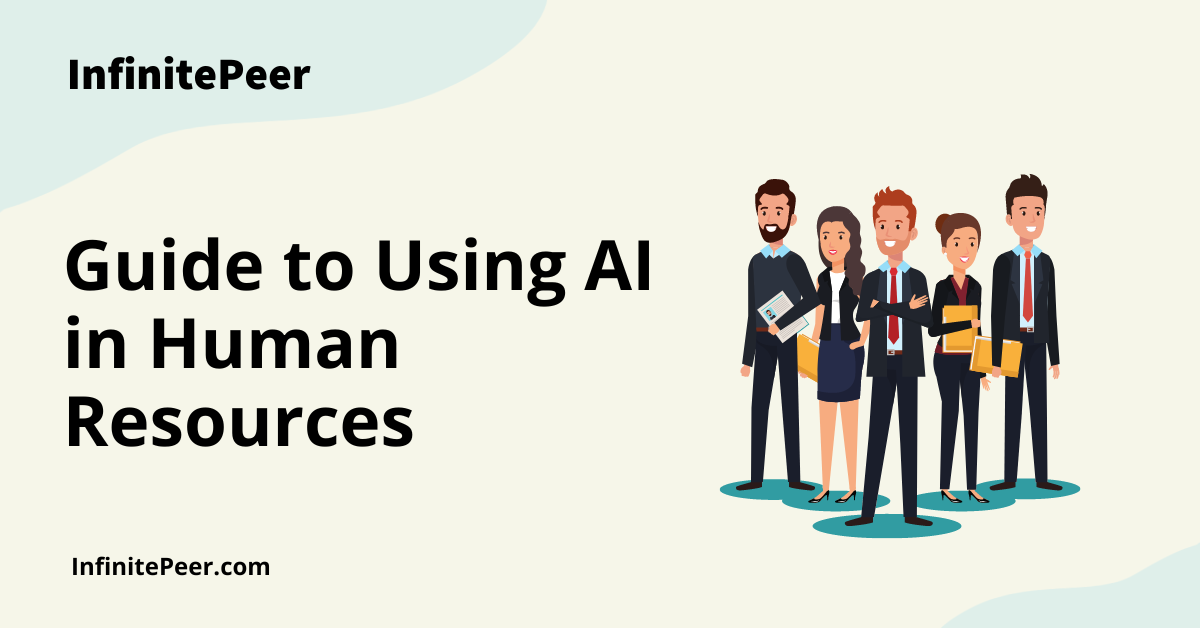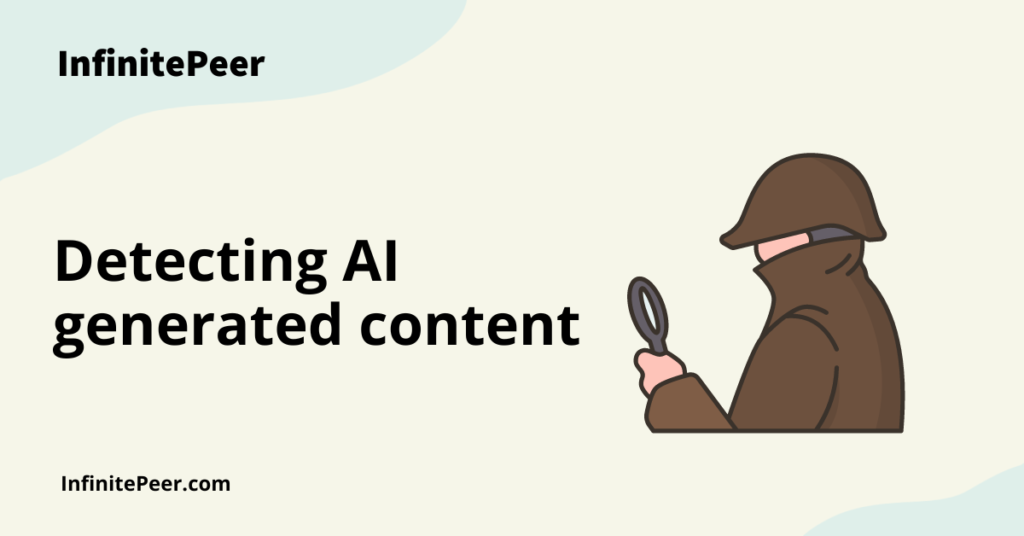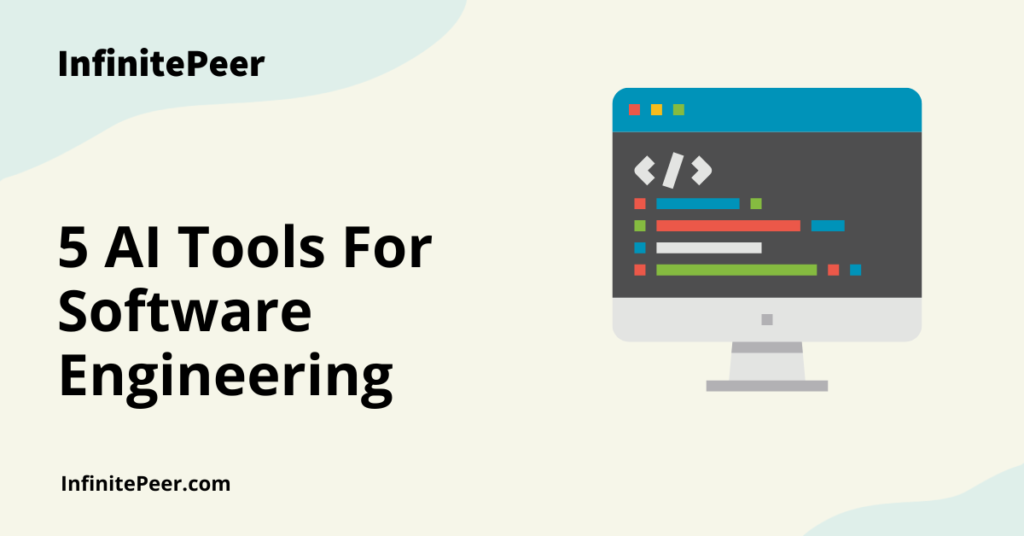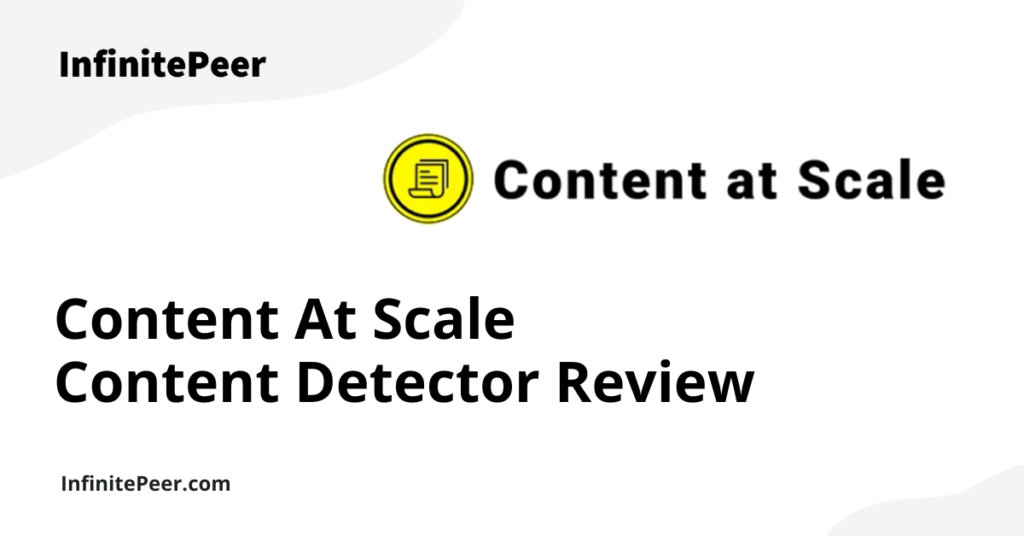HR is the beating heart of any organization. Human Resources solutions are especially crucial in the post-pandemic world that’s facing massive employee turnover rates combined with the complex phenomenon of the Great Resignation.
While HR is about all things human when it comes to business operations, you might be surprised to learn that Artificial Intelligence can be a great tool for boosting HR efforts for organizations of any scale.
So what is AI in HR? Is it effective? How can you leverage it to grow your business? You’ll get answers to these and many other questions in this detailed guide.
Human Resources 101
Before we dive deeper into the intricacies of AI solutions in Human Resources, let’s take a closer look at what role HR plays in business.
What is HR?
HR is an organization’s department or function that deals with employer-employee relations and ensures that every employee is the right fit for their position to maximize workplace efficiency.
In other words, HR strives to build and support a strong team of skilled professionals that work in a safe, productive, and ethical environment.
What are the main functions of an HR department?
HR is an essential operational bridge between employers and employees. That’s why HR departments are concerned with several key functions surrounding this relationship. These functions include:
Employee recruitment
HR managers pursue top talent that would bring value to a business. In particular, they
- develop and execute recruitment strategies;
- seek the best candidates with the right skill set for open positions; and
- conduct employee interviews and screening processes.
Employee training and development
To maintain productivity, increase employee expertise and knowledge, and maximize employee retention, HR departments also invest in extensive training and development.
They develop and implement:
- on-the-job training;
- educational programs for career advancement; and
- professional development initiatives.
Performance Management
HR managers strive to optimize employee performance to ensure it aligns with company goals and contributes to their achievement.
HR departments implement various tools and KPIs to track and evaluate each employee’s professional activity and its contribution to the overall business performance.
Compensation and Benefits
HR specialists also take care of compensating employees fairly and providing extra financial and non-financial incentives. This process includes:
- developing compensation strategies;
- organizing employee benefits programs;
- negotiating for additional corporate benefits for employees.
Employee relations
HR departments are responsible for maintaining a healthy workplace environment. They foster appropriate relationships both between employees and between the employer and employees by:
- developing and administering company policies that ensure equity and fair employee treatment;
- resolving workplace conflicts; and
- fostering employee loyalty.
How is AI being used in HR?
As you can see, HR departments carry overwhelming amounts of responsibilities connected with effective employee management. They juggle multiple daily tasks, communicate with dozens of people, and have operational responsibilities that span a number of functions, which are critical to the ongoing operation of a business.
And that’s where Artificial Intelligence comes to the rescue. More and more AI tools are useful in HR operations to boost productivity, automate tasks, and facilitate performance.
How exactly can you leverage AI in your HR team? Multiple AI solutions can become a real game changer for your HR department.
Use HR chatbots to improve the employee experience
Chatbots use the technology of Natural Language Processing (NLP) to simulate human-like verbal or written interactions. This tool is an excellent addition to a human professional as it can streamline and automate a portion of work-related communication.
Modern HR chatbots effectively take on many responsibilities of an HR manager, especially when it comes to addressing candidate and employee requests. An HR chatbot can:
- answer common or repetitive questions;
- process a large number of candidate and employee inquiries instantly;
- share important documentation, forms, and files with employees;
- guide employees in finding the necessary resources.
Use Case: Moveworks
Moveworks has developed an advanced HR chatbot that provides swift automatic HR assistance in both small and large companies.
Employees can instantly get in touch with the chatbots and get accurate responses or guidance:
- the chatbot answers general HR questions (holiday schedule, workplace policies, benefits inquiries, etc.);
- it helps employees resolve bigger HR-related issues by referring them to relevant company documentation;
- it helps fill out common employee forms instantly.
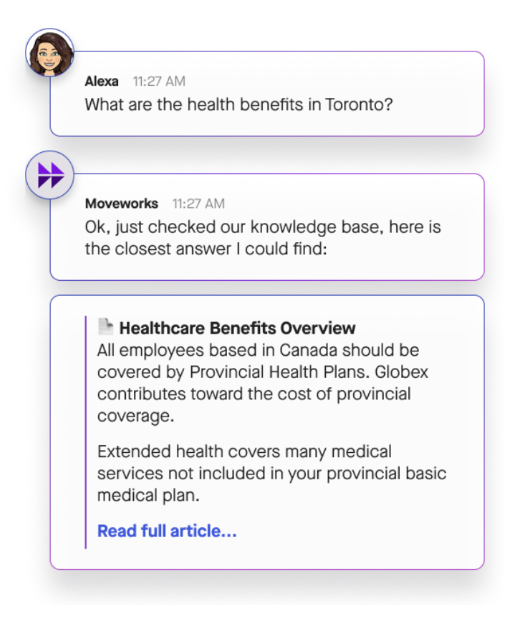
Cybersecurity company Palo Alto Networks implemented a Moveworks HR chatbot in 2020. Since then, more than 90% of Palo Alto Networks employees have used the bot to get accurate information and resolve workplace issues. The company has reported saving 351K hours of employee productivity thanks to this technology.
Leverage AI-powered employee engagement
One of the goals of an HR department is to keep employees engaged, productive, and enthusiastic about their jobs. This is often one of the hardest parts of an HR team’s job. AI tools can assist HR specialists and managers in this challenging yet rewarding mission.
To boost employee experience within your company, implement an AI solution that can:
- automate employee feedback collection;
- streamline the onboarding process for new employees;
- help employees set and achieve performance goals;
- gamify performance tracking; and
- build personalized employee training programs and offer relevant educational resources.
All these features will allow you to create a stronger company culture where every employee feels seen and valued. Besides, AI can boost employee performance by focusing on smart goal-setting tactics and identifying the right resources and training to enable these goals.
Use Case: the Rezolve AI Employee Engagement Platform
Rezolve AI recognizes the importance of comprehensive employee engagement and provides businesses with a software solution that covers all aspects of this process.
With Rezolve, you can:
- create detailed employee surveys and integrate them into Microsoft Teams and Slack;
- keep employees in the loop with automatic notifications (policy updates, announcements, etc.);
- build interactive personalized learning modules for employees; and
- measure employee engagement rates with analytical tools.
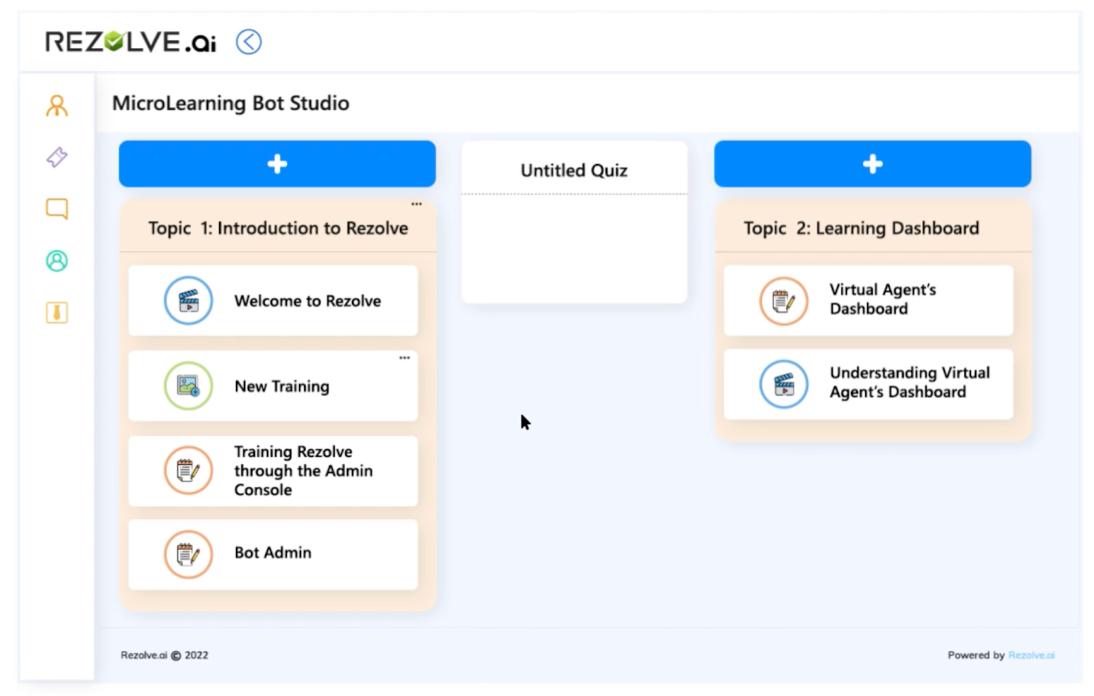
Rezolve users report that this AI platform improves the employee onboarding process. It also helps HR managers track employee engagement and build appropriate improvement strategies.
Automate employee screening and recruitment
Finding the right candidate to fill an open position in your company can be a painstaking process. HR managers need to review hundreds of resumes and conduct skills assessments, background checks, and interviews – all time-consuming tasks.
AI in recruiting leverages advanced algorithms to turn these time-consuming tasks into instantly completed steps that require a few clicks.
Here are the main recruitment duties AI can take on to free up HR managers’ time:
- conducting auto-sourcing and auto-screening of candidate resumes;
- performing skills assessments and predicting the candidate’s performance;
- implementing recruiter chatbots to collect candidate data;
- automating interview scheduling;
- scaling the overall recruitment process efficiently.
According to statistics, recruitment specialists find that AI is most helpful with sourcing, screening, and nurturing candidates:
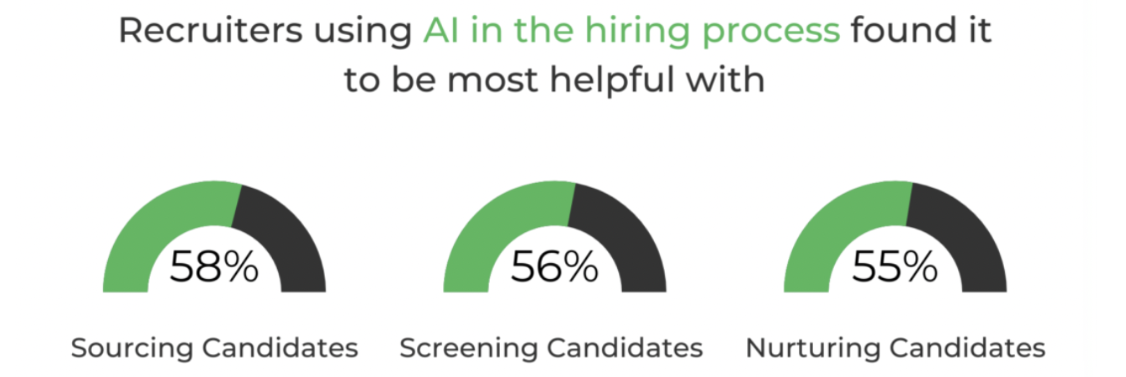
Use Case: TurboHire
TurboHire is often rated as a top-quality AI solution for recruitment automation. This AI-driven platform covers all key aspects of the hiring process:
- it optimizes candidate sourcing activities;
- conducts accurate resume assessments and scoring;
- automates interview scheduling;
- collects and categorizes data and feedback throughout the recruiting process; and
- effectively engages candidates.
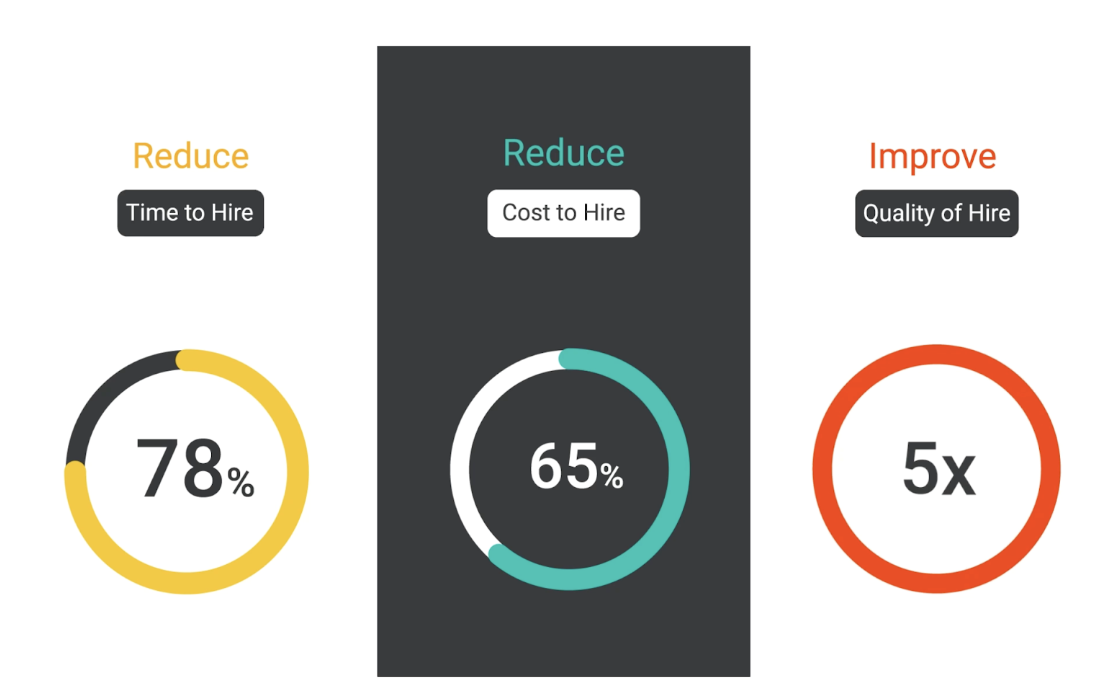
TurboHire users also highlight that the platform is highly customizable, which makes it easy to tailor the recruitment process based on your company’s needs.
Indian fintech company ClearTax managed to achieve a 3x hiring speed and find more than 300 employees with the help of TurboHire’s advanced features.
Conduct accurate people analytics
People analytics (PA) is a crucial component of a solid HR strategy for any business. People analytics is necessary to turn workplace data into informed insights, that allow for effective management decisions.
While collecting employee data is now easier than ever before, gaining valuable insights from this data can be challenging. Once again, modern AI algorithms can solve the problem.
- people analytics tools process massive amounts of data to offer solutions to various problems or point to improvement areas. For example, if your company has difficulty retaining employees and has high turnover rates, AI can analyze employee satisfaction levels and highlight the root cause of the issue.
- PA will also allow you to personalize incentivizing practices for your employees.
Use Case: BetterWorks
BetterWorks is a multifaceted employee performance management platform that emphasizes quality people analytics. It gathers and processes valuable data to optimize workflows and help employees succeed both individually and as part of the team:
- the tool reviews employee feedback across various parameters;
- it assesses employee engagement, performance, and efficiency;
- it identifies which departments/segments of your company are struggling to achieve goals;
- it offers development and improvement opportunities based on analytics.
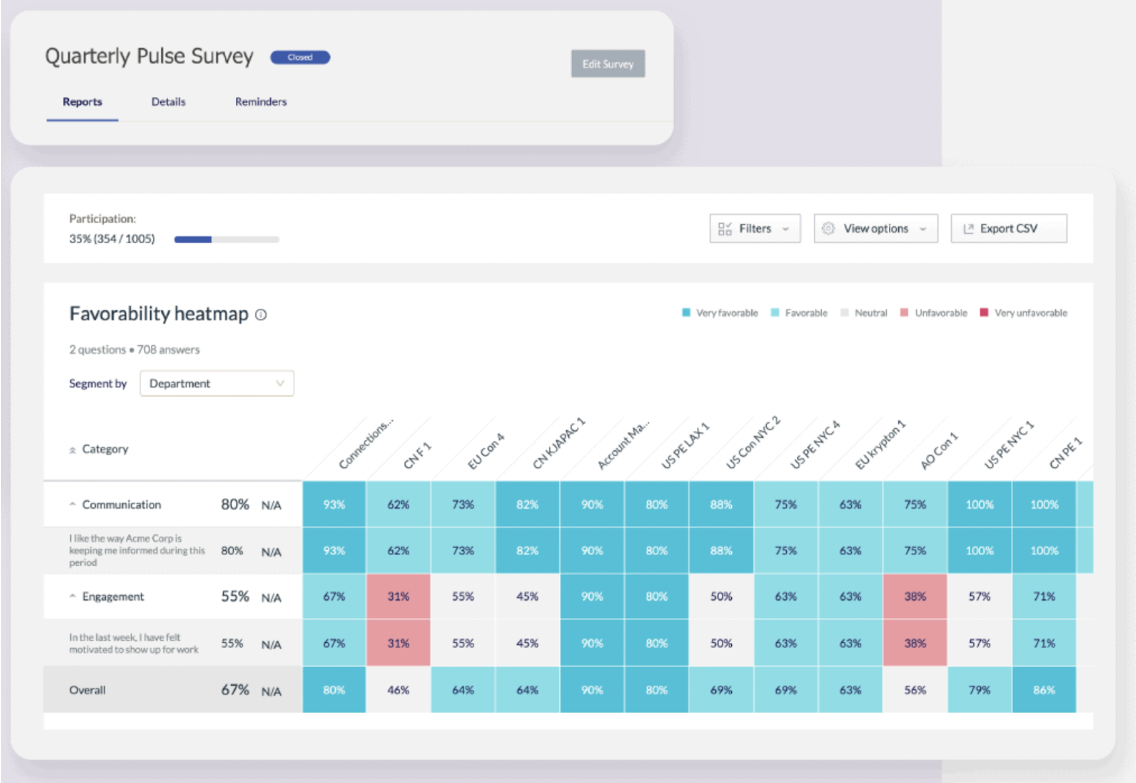
Software company CBORD leveraged BetterWorks and its PA tool to revolutionize its workplace culture “focused on alignment, engagement, performance, accountability, and transparency between team members and managers.” It has led to better productivity and overall business success.
Pro-tip: if you’re a bigger company, you can also consider Microsoft Viva – an employee experience platform that conducts deep PA on a larger scale. Among other things, it assesses and prevents the risk of employee burnout and promotes healthy workplace culture.
Benefits of AI in HR
With all the functions AI can now execute for your HR department, what are the tangible benefits you can gain from implementing it? The advantages of using AI in HR are numerous:
- Eliminating time-consuming manual tasks. HR managers can delegate repetitive, lower-value tasks to AI. Duties like generating and processing standard documentation, answering frequently asked employee questions, and making policy announcements can be easily managed by AI tools. It gives HR professionals more time to deal with higher-value tasks and projects;
- Higher levels of employee satisfaction. AI allows for developing personalized employee experiences, using vast amounts of data, which boosts employee satisfaction;
- Better employee retention. With the help of automated PA, you can track such employee behavior patterns as burnout and low engagement and address these issues head-on and proactively. It helps you retain talent and organically drive up productivity at the same time;
- Removing bias and discrimination*. If you program an AI tool appropriately, you will be able to eliminate (un)conscious bias in the process of screening/hiring talent and assessing employee performance. For example, you can remove gender or ethnic bias in the process of choosing candidates for open positions.
*Unfortunately, data isn’t always neutral. In fact, using AI in HR can perpetuate biases as well (more on that in a second).
Are there risks when using AI in HR?
As we’ve already mentioned, you can either leverage AI in HR tools to eliminate bias in candidate/employee relationships or sustain and even deepen them.
How is this possible? Isn’t AI supposed to be completely unbiased?
The thing is, AI gathers and learns from the previous HR practices and decision-making patterns of a company. It also bases decisions on the input human HR managers execute when launching the tool.
- In other words, if you set parameters that already include conscious or unconscious bias, AI will perpetuate these patterns, because it learns from them. And the more it does, the more profoundly the bias will manifest.
Even industry giants have fallen victim to this machine-learning pitfall. In 2018, Amazon had to disable its AI-driven hiring protocol because the HR department had made an alarming discovery. The algorithm was biased against female candidates, especially for technical positions. It happened because the AI tool learned from the previous 10 years of Amazon’s hiring history which had been dominated by male hires. Thus, the system automatically gave preference to men and downgraded applications from women.
How can you avoid biased decision-making by AI?
The short answer is: carefully, thoughtfully, and ethically set up your recruitment algorithms:
- Feed the AI tool with candidate data from all demographics in an equal proportion;
- Test the algorithm to see if it shows bias;
- Don’t rely solely on AI during the screening/hiring process. It should be an addition to human HR managers, not their entire replacement.
What is the future of AI in HR?
Although AI solutions for HR are not perfect, they have solid potential for current and future implementation in the industry. Here are some major trends for the upcoming years:
Responsible innovation to eliminate biased decision-making by AI
Responsible innovation takes into account how new technology and business solutions impact society. This approach is definitely relevant for AI in HR and especially recruitment and performance management.
HR AI software developers will keep striving to create AI solutions that eliminate bias to ensure fair, merit-based hiring and performance management processes.
The use of advanced NLP for better people analytics
To boost the quality of people analytics and gain more useful insights from it, HR AI solutions will increasingly tap into advanced NLP.
For example, PA tools can analyze employee communication as data sets to understand and predict such things as:
- Voice of the Employee (VoE);
- workplace climate; and
- factors of employee engagement and productivity.
With all this knowledge at hand, your company will be better equipped to retain employees and motivate them to improve their performance.
Better personalization for employees’ career development
Improved personalization is another crucial development vector for AI in HR.
Based on collecting and processing large volumes of data and carefully listening to the Voice of the Employee, AI will be able to assess each employee’s skill set. It will then suggest areas of improvement and even tailor highly personalized training programs for your employees. This is an excellent way to boost career development and foster company employee loyalty at your company.
Conclusion
Now you know that AI has it’s place in Human Resources. In fact, 66% of CEOs believe that AI can drive major value in HR. And it’s not only about task automation. HR AI tools are getting better and better at:
- finding and hiring top talent;
- retaining employees and personalizing employee experiences;
- helping foster workplace culture.
The face of HR is changing, seriously consider embracing AI to improve the overall efficiency and effectiveness of the HR function at your company.
